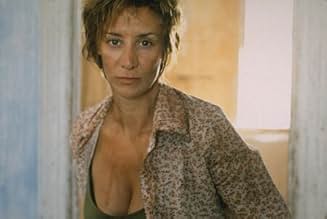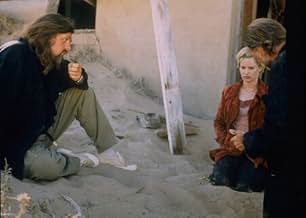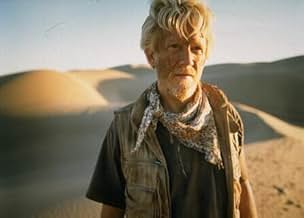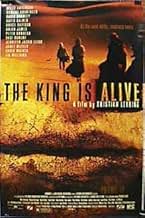When a bus breaks down in the desert, the passengers decide to stage "King Lear."When a bus breaks down in the desert, the passengers decide to stage "King Lear."When a bus breaks down in the desert, the passengers decide to stage "King Lear."
- Director
- Writers
- Stars
- Awards
- 3 wins & 4 nominations total
- Director
- Writers
- All cast & crew
- Production, box office & more at IMDbPro
Featured reviews
A brilliant and yet cruel tale of the human condition by the words of Shakespeare's King Lear. The true nature of this film is in the relationship between the rawness of the desert and the fragility of the social being. Amazingly, the spirit of the desert witnesses the demise of a group of people who are facing death, acting Shakespeare to deceive it and ironically get deceived by fate itself at the end. The realistic notion, given by hand-held camera as well by the wonderful colors captured, will dive one's in the crucial themes of the movie: death, love and hope.
- but the movie is deader'n a doornail. It reminded me of "The Claim", another darling of some of our local newspaper critics. Both films are pretentious and dull, with no characters to care about, and nothing much to say. ("The Claim", I guess, is saying that if you sell your wife and baby, you'll feel bad about it later even if you've made a lot of money in the interim. Well, duhhh!) "The King is Alive" is apparently saying that bus drivers not only navigate by compass in the desert, but are stupid enough not to notice that their compasses haven't moved a fraction of an inch over several score miles. It is also saying people waiting around for rescue on the desert are going to get dirty, grow beards and get upset, which I already knew. What I didn't know, was that people in such situations will engage in amateur theatrics. Really? Okay, but so what?
A camera placed within five inches of the character's face may be of interest to a dermatologist, but brother, dialogue and body language reveals character, not extreme close ups.
I couldn't make it to the end of "The King is Alive". I left as soon as one of the characters, presented as thirst-crazed and exhausted before he finds the body of the would be rescuer who set off several days before, manages to stroll back to the group somehow refreshed.
Neither film maker seems to have taken to heart the concept of shot-continuity. Come on guys, you MUST have heard of it in film-making 101. Or aren't they teaching that anymore?
If this is Danish Dagme, I'll take Dagmar.
I remain unimpressed, worried, and confused about "Dogma". Is there anything fresh being done here? As for the existential possibilities of a group stranded together in unfamiliar, perhaps threatening conditions; as for the warped-mirroring of theatre and life; and as for disjointed filming and bumpy cameras -- please, don't anyone get their hopes up that there's anything revealing, glimmering, or meaningful here. The film takes a small view of human nature, yet there is one character, the native who watches and narrates, who seems to have a genuine eye. Why couldn't this have been the film- maker's eye? Perhaps ancient cultures are just not "Dogmatic" enough for this postmodern world. I am only glad that the film-makers had room in their hearts for this character.
Wow. I was speechless after seeing this movie for the first time (a feeling I still experience even after almost a dozen viewings). I've never seen such an eloquent, spellbinding, and above all logical, presnetation of King Lear. Truly the best setting for such a play is by a broken down bus in a desert.
The first thing that struck me about the film was the unsurpassed clarity of the footage. Even in dark scenes around the campfire everyone's face is perfectly in focus and the viewer feels he is with this poor unfortunate bus travelers in where ever it was they got stuck. The well placed cut aways of the lost traveler in the desert enhance the story-telling experience.
Sike, this movie sunks.
The first thing that struck me about the film was the unsurpassed clarity of the footage. Even in dark scenes around the campfire everyone's face is perfectly in focus and the viewer feels he is with this poor unfortunate bus travelers in where ever it was they got stuck. The well placed cut aways of the lost traveler in the desert enhance the story-telling experience.
Sike, this movie sunks.
While shifting airports by bus in Africa, a group of passengers is driven to the middle of nowhere in the desert by the driver that is following a defective compass. They run out of gas and they reach a ghost village inhabited by a single man, Kanana (Peter Kubheka). One passenger that has experience with desert gives five advices to the others to survive in the spot, among them to keep the spirit high, while he travels through the desert seeking for help. One intellectual in the stranded group suggests the performance of King Lear to keep the morale of the survivors. Along the days, while hope decreases, the tension increases among the survivors.
"The King is Alive" is a tragedy in a tragedy, with a group of people stranded in the desert performing King Lear to keep the spirit of the survivors. The story has a breathless beginning with the driver absolutely lost and the despair of the passengers and is raw and disturbing, when the survivors return to a primitive stage of human condition. The performances are outstanding and this Dogma 85 film was released in Brazil on VHS by Cult Films Distributor. My vote is seven.
Title (Brazil): "O Rei Está Vivo" ("The King is Alive")
"The King is Alive" is a tragedy in a tragedy, with a group of people stranded in the desert performing King Lear to keep the spirit of the survivors. The story has a breathless beginning with the driver absolutely lost and the despair of the passengers and is raw and disturbing, when the survivors return to a primitive stage of human condition. The performances are outstanding and this Dogma 85 film was released in Brazil on VHS by Cult Films Distributor. My vote is seven.
Title (Brazil): "O Rei Está Vivo" ("The King is Alive")
Did you know
- TriviaThis is the fourth film to be made according to the Dogme 95 rules. The Dogme 95 was founded by Lars von Trier, Thomas Vinterberg, Søren Kragh-Jacobsen and Kristian Levring.
- Crazy creditsIn Memoriam Brion James
- How long is The King Is Alive?Powered by Alexa
Details
- Release date
- Countries of origin
- Languages
- Also known as
- El rey está vivo
- Filming locations
- Production companies
- See more company credits at IMDbPro
Box office
- Gross US & Canada
- $17,929
- Opening weekend US & Canada
- $17,929
- May 13, 2001
- Gross worldwide
- $17,929
Contribute to this page
Suggest an edit or add missing content


































